What Are the Signs of an Overwhelmed Cat?
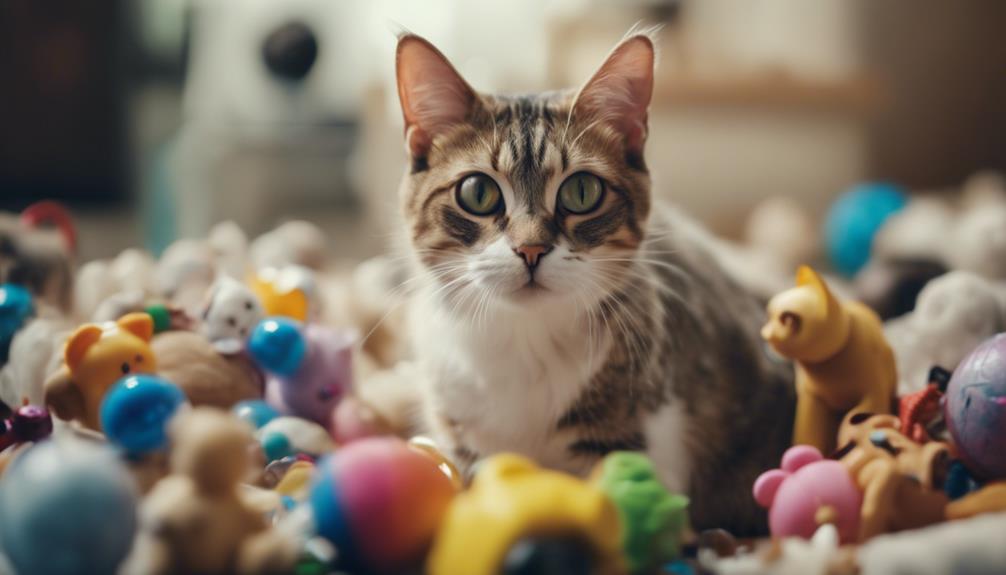
Signs of an overwhelmed cat:
- Changes in behavior like excessive hiding or sudden aggression can indicate stress levels.
Understand these signs to support and comfort your feline companion effectively.
Excessive Hiding
Excessive hiding in cats is often an early indicator of stress or discomfort in their environment. Hiding behavior can be triggered by various stressors such as loud noises, changes in routine, new pets, or unfamiliar visitors. Cats may retreat to secluded areas like under the bed, in closets, or behind furniture to cope with these stress triggers.
To help cats feel more secure, providing safe spaces like cozy hiding spots, cat trees, or elevated perches can offer them a sense of security. It's essential to observe the frequency and duration of their hiding behavior, as persistent isolation could indicate underlying issues that need to be addressed promptly.
Understanding their coping mechanisms and respecting their need for personal space can aid in creating a harmonious environment for your feline companion. By recognizing the signs of excessive hiding and implementing strategies to reduce stress, you can help your cat feel more comfortable and secure in their surroundings.
Changes in Appetite
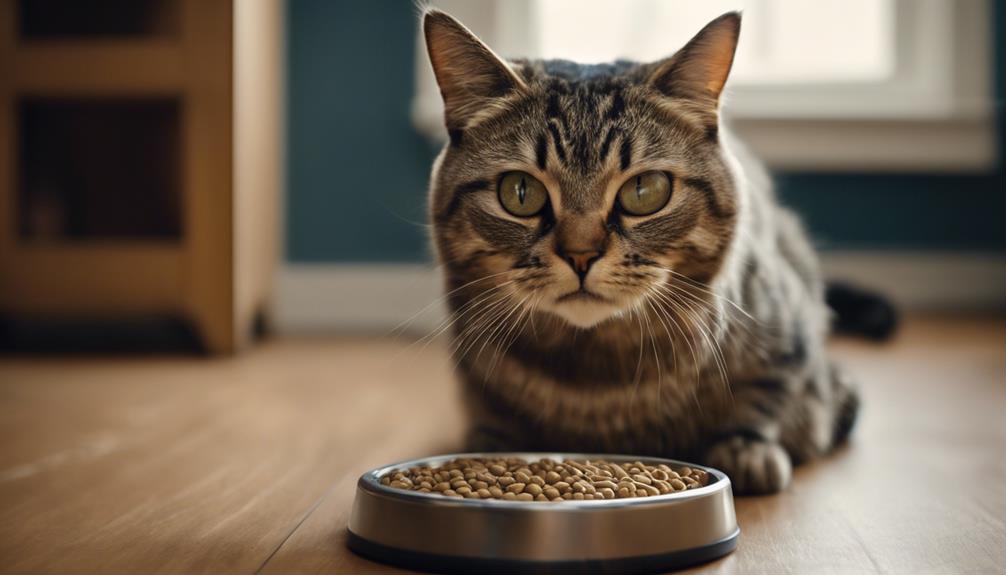
Cats experiencing overwhelming stress may display changes in their eating habits, such as a sudden loss of appetite. This shift in appetite can be a crucial indicator of their mental and emotional state.
Observing and addressing these alterations promptly can help ensure the well-being of the cat.
Eating Habits Shift
Changes in a cat's appetite can be a key indicator of stress or other underlying health issues. When a cat is overwhelmed, it may exhibit changes in its eating habits, leading to weight loss due to decreased food intake.
Stress can impact a cat's nutrition, causing it to lose interest in food or have irregular eating patterns. Due to the presence of stressors, a cat may struggle to maintain a healthy appetite, resulting in weight loss over time.
Monitoring a cat's eating habits is crucial in identifying signs of distress or health problems early on. If you notice significant shifts in your cat's appetite, it's recommended to consult a veterinarian to address any potential issues promptly.
Loss of Appetite
When a cat experiences overwhelming stress, its appetite can significantly diminish, indicating a potential loss of appetite. This change in eating habits can have detrimental effects on the cat's health and wellbeing. Here are some key indicators to watch for:
- Weight Loss: A decreased appetite can lead to weight loss in cats, which can be concerning if left unaddressed.
- Lethargy: Cats with a reduced appetite may also exhibit signs of lethargy and decreased energy levels.
- Health Problems: Prolonged loss of appetite can result in various health issues due to inadequate nutrition intake.
- Anxiety: Loss of appetite in cats can be a manifestation of underlying anxiety or stress that needs to be addressed promptly.
Monitoring your cat's appetite is crucial to ensure their overall well-being and prevent any potential health concerns.
Aggression or Irritability
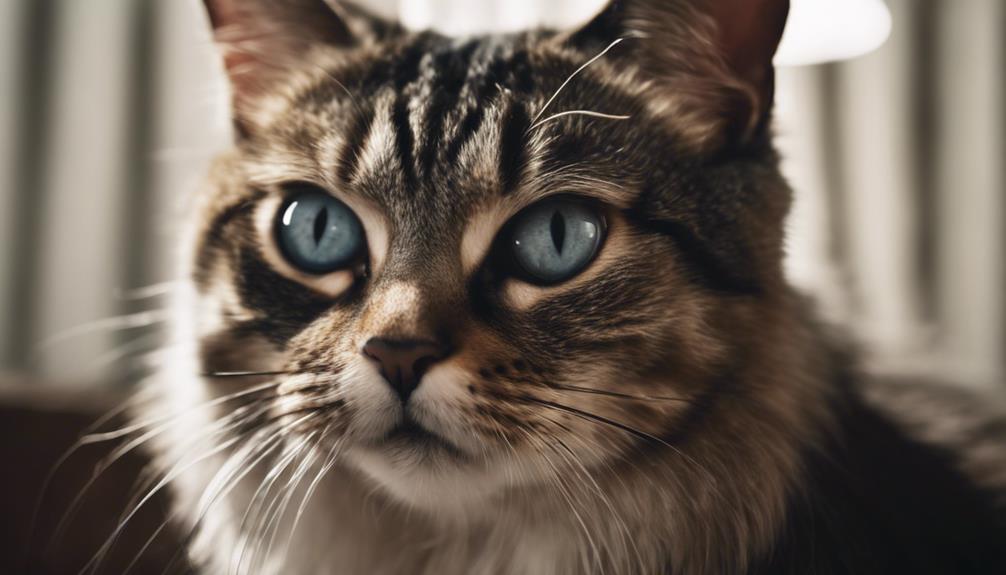
When a cat is overwhelmed, it may exhibit signs of aggression or irritability. These behavioral changes can manifest in various ways, from hissing and growling to swatting or biting.
It's crucial to also pay attention to the cat's body language cues, as they can provide insight into its emotional state.
Behavioral Changes
Exhibiting signs of an overwhelmed cat may include displaying increased aggression or irritability towards humans or other animals. When a cat is overwhelmed, their behavior can change, and it's important to recognize these signs to provide appropriate care.
Here are some behavioral changes to look out for:
- Hissing and Swatting: The cat may become more vocal and physically aggressive.
- Avoidance: The cat might isolate themselves from interactions they previously enjoyed.
- Unpredictable Reactions: Sudden outbursts of aggression or irritability without apparent triggers.
- Decreased Tolerance: Reduced patience with handling, grooming, or playtime.
Understanding these behavioral changes can help in implementing suitable strategies such as play therapy and anxiety management for the cat's well-being.
Body Language Cues
Body language cues can provide valuable insights into a cat's level of aggression or irritability. Tail flicking and ear flattening are common signs of an overwhelmed cat displaying aggression or irritability. On the other hand, purring and slow blinking typically indicate a calmer and more content feline. Understanding these cues can help owners recognize when their cat may be feeling overwhelmed and potentially prevent any escalation of aggressive behavior. Here is a table summarizing these body language cues:
| Aggression/Irritability | Calm/Content |
|---|---|
| Tail flicking | Purring |
| Ear flattening | Slow blinking |
Excessive Grooming or Self-Mutilation
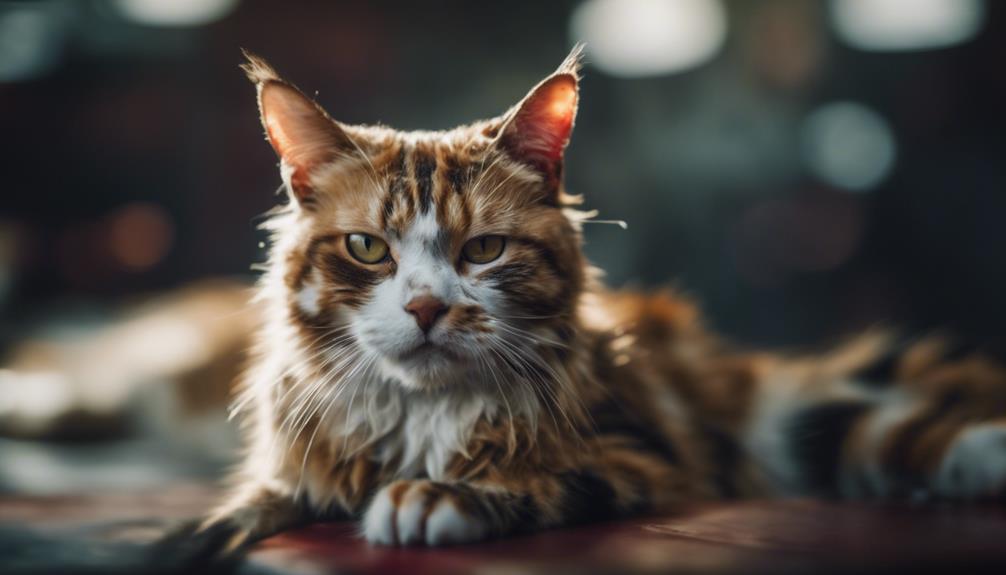
The cat may excessively groom itself or engage in self-mutilation as a sign of being overwhelmed. This behavior can indicate underlying issues such as anxiety or emotional distress. Here are some signs to look out for:
- Obsessive Licking: The cat constantly licks itself in a particular area, leading to hair loss or skin irritation.
- Biting or Scratching: Excessive biting or scratching of the skin beyond normal grooming can result in wounds or scabs.
- Bald Patches: Areas where the cat has groomed excessively may show as bald patches on the fur.
- Inflammation or Infection: Continuous self-mutilation can lead to skin inflammation or secondary infections.
It's crucial to address these behaviors promptly by consulting a veterinarian to rule out any underlying medical conditions. Environmental enrichment, behavioral therapy, or stress-reducing techniques may be recommended to help the cat cope with its overwhelming feelings.
Litter Box Issues
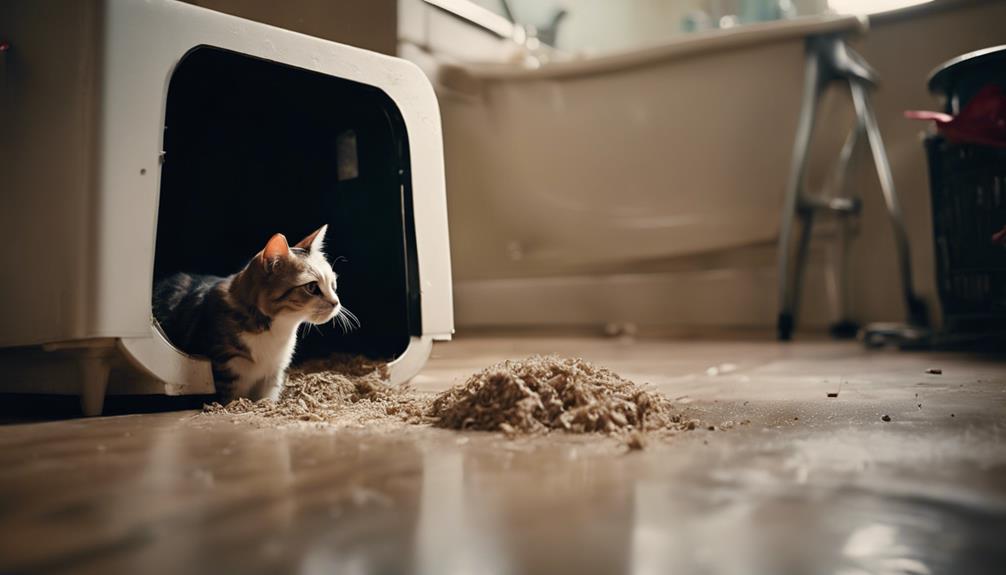
Are there specific signs that indicate a cat is experiencing litter box issues? Litter box problems can often be a clear indicator that a cat is struggling with underlying issues such as stress or anxiety. Cats are typically clean animals and instinctively seek out a designated area for elimination. If a cat suddenly starts to avoid the litter box or has accidents outside of it, it could signal a problem.
Litter training is essential for cats, and any deviation from their usual behavior may point towards an issue. Cats that are experiencing stress may exhibit litter box problems as a way of expressing their discomfort. Similarly, cats with anxiety may also develop aversions to their litter box.
It is crucial to address litter box issues promptly to rule out any medical conditions and provide the necessary support for the cat. Consulting with a veterinarian can help determine the root cause of the problem and implement appropriate strategies for resolving litter box issues.
Withdrawal or Avoidance
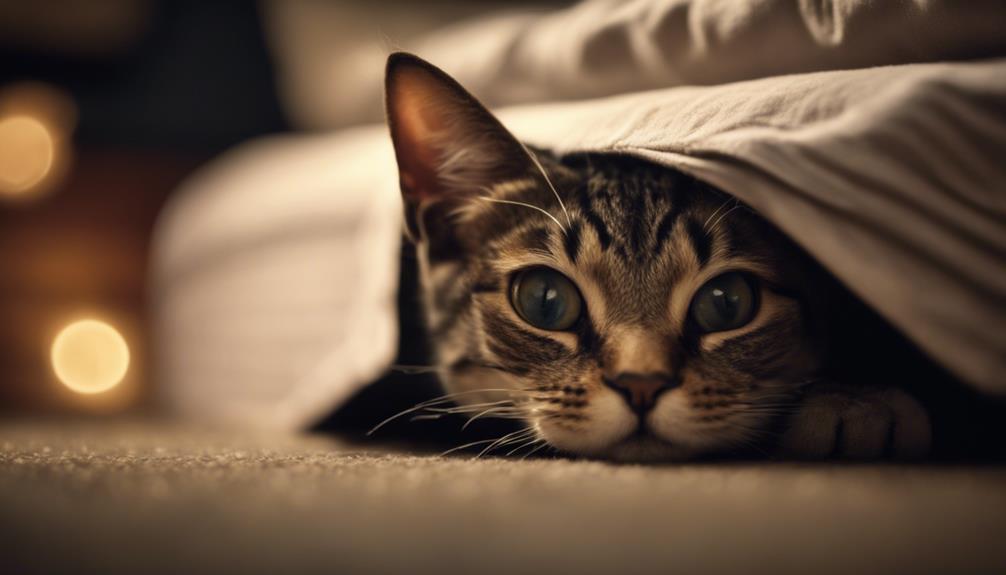
Cats experiencing litter box problems may exhibit withdrawal or avoidance behaviors as a response to their discomfort or stress. When overwhelmed, felines often resort to distancing themselves or avoiding certain situations altogether. Here are some stress signals and coping mechanisms to look out for:
- Hiding: The cat may retreat to secluded areas like under the bed or in closets to avoid interactions.
- Reduced Socialization: They might show disinterest in affection, preferring solitude over human or pet companionship.
- Refusal to Eat: Stress can lead to a decreased appetite, causing the cat to avoid food or treats.
- Avoidance of Litter Box: In extreme cases of stress, the cat may start avoiding the litter box altogether, leading to accidents outside the designated area.
Recognizing these signs of withdrawal or avoidance can help caregivers intervene early, providing the necessary support and creating a more comfortable environment for the overwhelmed cat.
Excessive Vocalization
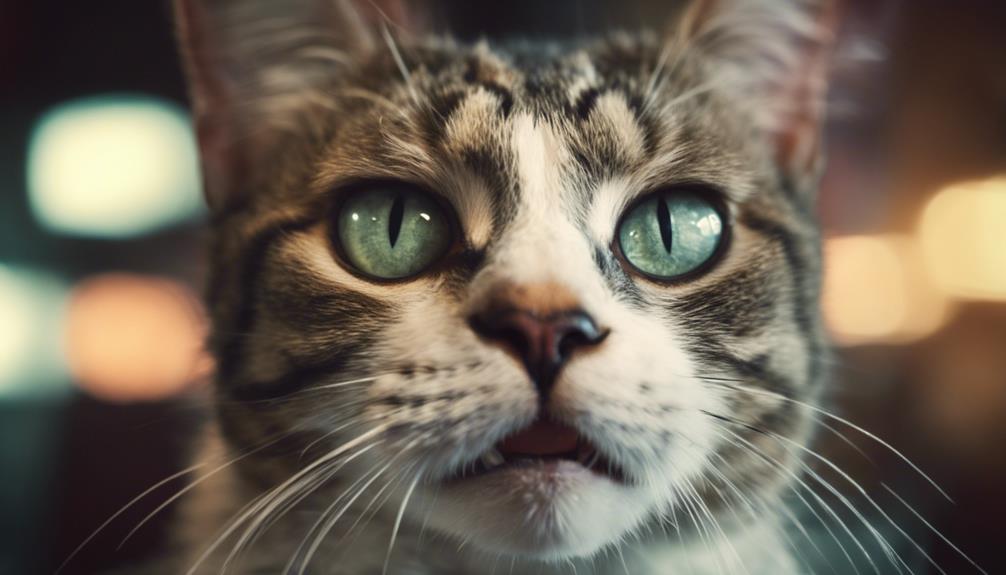
Characterized by an incessant vocalization that exceeds normal communication, excessive meowing in cats can indicate underlying stress or health issues. Cats may vocalize excessively due to various reasons, such as stress, anxiety, illness, or seeking attention. Understanding the triggers for this behavior is crucial in addressing the root cause and providing appropriate care for the cat.
| Stress Relieving Activities | Vocalization Triggers |
|---|---|
| Engaging toys | Loneliness |
| Interactive play | Changes in routine |
| Quiet hiding spots | Medical issues |
To help a cat that is exhibiting excessive vocalization, it is essential to create a calm and comforting environment. Providing stress-relieving activities like engaging toys, interactive play sessions, and quiet hiding spots can help alleviate anxiety and reduce excessive vocalization. Identifying and addressing the triggers, such as loneliness, changes in routine, or underlying medical issues, is key to helping the cat feel more secure and content. If the behavior persists, consulting a veterinarian for further evaluation and guidance is recommended.
Frequently Asked Questions
How Can I Help My Overwhelmed Cat Feel More Comfortable in Their Environment?
To help a overwhelmed cat feel more comfortable in their environment, focus on stress reduction through enrichment activities. Engage in bonding exercises and provide safe spaces for relaxation. Consistent care and attention can aid in creating a sense of security for the cat.
Are There Any Specific Triggers That May Cause a Cat to Become Overwhelmed?
Specific triggers that may cause a cat to become overwhelmed include changes in routine, loud noises, overcrowding, and lack of hiding spots. Stress management and environmental enrichment are crucial to help cats cope with these triggers.
Can an Overwhelmed Cat's Behavior Improve With Time, or Is Professional Intervention Necessary?
Improvement in an overwhelmed cat's behavior can often be seen with time. Behavior modification techniques, along with owner education and patience, are key. Professional intervention may be necessary in severe cases that do not respond to these measures.
Are There Any Long-Term Effects on a Cat's Health From Being Overwhelmed?
Stress management is crucial for cats as chronic overwhelming stress can lead to various health consequences, including behavioral issues and physical ailments. With proper care and a calm environment, cats can often recover and thrive.
How Can I Prevent My Cat From Becoming Overwhelmed in the Future?
To prevent overwhelming a cat in the future, stress management and environmental enrichment are key. Providing safe spaces, interactive toys, and regular playtime can help maintain a balanced environment that promotes mental well-being and prevents stress.










